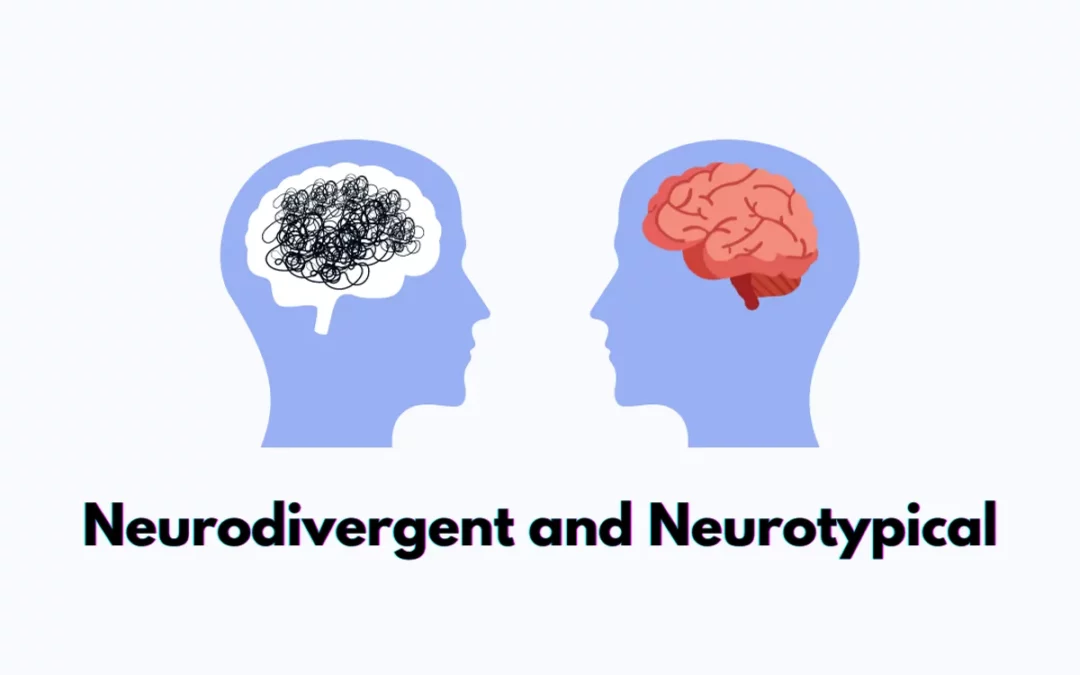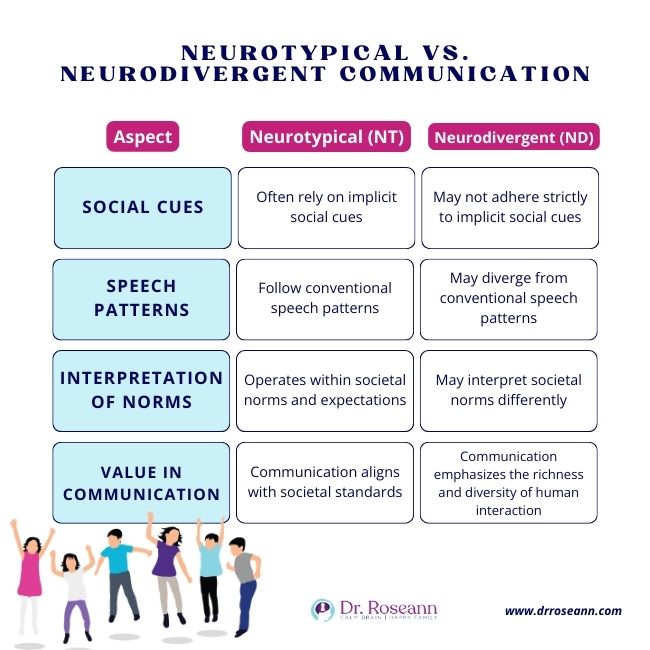Understanding the concept of "neurotypical" is essential in today's diverse world. It refers to individuals whose brain functions and processes are considered typical or standard.
Neurotypical people make up the majority of the population. They do not exhibit traits or behaviors associated with neurological conditions like autism, ADHD, or dyslexia. This term helps distinguish between those with typical neurological development and those with neurodivergent conditions.
Understanding this distinction fosters better communication and inclusivity. It also helps neurotypical individuals become better allies to their neurodivergent peers. This blog will explore neurotypical characteristics, the importance of understanding neurodivergence, and how neurotypical people can support neurodivergent individuals effectively. Stay tuned to learn more about the rich tapestry of human neurodiversity.

Credit: docvita.com
Understanding Neurodiversity
Neurotypical individuals have typical cognitive functioning and behaviors. They do not face challenges often associated with neurodiverse conditions. Understanding neurodiversity helps in appreciating different ways people think and interact.
Understanding neurodiversity helps us appreciate the range of human brains. Neurodiversity includes everyone, highlighting that differences in brain function are normal. Let's dive into this fascinating topic.
What Is Neurodiversity?
Neurodiversity means recognizing the variety of human brain functions. People have different ways of thinking, learning, and processing information. This concept sees these differences as natural and valuable.
Common Neurodiverse Conditions
Many conditions fall under neurodiversity. Here are a few examples:
- Autism Spectrum Disorder (ASD): Affects social interaction and communication.
- Attention Deficit Hyperactivity Disorder (ADHD): Impacts focus and self-control.
- Dyslexia: Influences reading and language processing.
- Dyspraxia: Affects coordination and movement skills.
Embracing Neurodiversity In Society
Supporting neurodiversity benefits everyone. It creates a more inclusive environment. Here are some ways to embrace it:
- Promote awareness: Educate others about neurodiversity.
- Encourage acceptance: Celebrate differences instead of judging them.
- Provide support: Offer resources and accommodations.
Benefits Of Neurodiverse Perspectives
Neurodiverse individuals bring unique skills. These perspectives can enhance creativity and problem-solving:
- Innovative thinking: New ways to approach challenges.
- Attention to detail: Strong focus on specific tasks.
- Diverse talents: Unique abilities that enrich teams.
Challenges Faced By Neurodiverse Individuals
Understanding the challenges can help us provide better support. Here are some common difficulties:
- Social interaction: Struggles with communication and relationships.
- Sensory sensitivities: Heightened reactions to sounds, lights, or textures.
- Learning differences: Alternative ways of processing information.
Supporting Neurodiverse Individuals
Offering support can make a significant difference. Consider these approaches:
- Create inclusive spaces: Adapt environments to meet diverse needs.
- Use clear communication: Simple language and direct instructions.
- Provide resources: Access to tools and support networks.
By understanding and embracing neurodiversity, we can create a more inclusive world. Everyone benefits when we value each other's unique contributions.
The Difference Between Neurotypical And Neurodivergent
Neurotypical refers to individuals whose brain functions align with societal norms. They process information and respond in expected ways. Neurotypical people often find social interactions straightforward.
Understanding the differences between neurotypical and neurodivergent can improve our interactions. It helps us create a more inclusive environment. Let’s explore these terms in detail.
Neurotypical Characteristics
Neurotypical people have brain functions considered standard. They process information in expected ways. Here's a closer look:
- Social Cues: Easily understand and respond to social signals.
- Communication: Use and understand typical speech patterns.
- Sensory Processing: Handle sensory inputs without distress.
- Problem-Solving: Follow standard methods to solve problems.
Neurodivergent Characteristics
Neurodivergent individuals have different brain functions. Their processing differs from the norm. Here are key aspects:
- Varied Communication Styles: May use non-traditional speech or gestures.
- Unique Sensory Processing: Experience heightened or reduced sensory responses.
- Different Social Interactions: Interpret social cues differently.
- Innovative Problem-Solving: Use creative approaches to challenges.
Common Misconceptions
There are several myths about neurotypical and neurodivergent individuals. Let's clear them up:
- Neurotypical equals normal: Neurotypical is common, but not the only way to be.
- Neurodivergent people are disabled: They just have different strengths.
- Neurodivergent equals autism: It includes ADHD, dyslexia, and more.
Benefits Of Understanding
Recognizing these differences fosters empathy. It also builds stronger relationships. Here’s why it's beneficial:
- Improves Communication: Tailors interactions to individual needs.
- Enhances Teamwork: Leverages diverse strengths in group settings.
- Promotes Inclusion: Ensures everyone feels valued and understood.
- Boosts Productivity: Creates supportive environments for all.
By understanding these concepts, we support and respect everyone. This knowledge helps us appreciate unique perspectives.
Conditions With Neurodivergence
Neurotypical individuals have typical neurological development and behavior. They do not show signs of neurodivergent conditions like autism or ADHD. Their cognitive functions align with what is considered the societal norm.
Neurodivergence refers to variations in the human brain. It encompasses a variety of conditions that differ from the neurotypical standard. This diversity in brain function can lead to unique strengths and challenges. Let’s explore some conditions associated with neurodivergence.
Autism Spectrum Disorder (asd)
Autism Spectrum Disorder (ASD) affects communication and behavior. People with ASD may have:
- Social difficulties: Challenges in understanding social cues.
- Repetitive behaviors: Engaging in repetitive actions or routines.
- Sensory sensitivities: Strong reactions to certain sounds, lights, or textures.
Attention Deficit Hyperactivity Disorder (adhd)
ADHD is characterized by inattention, hyperactivity, and impulsivity. People with ADHD may:
- Struggle with focus: Difficulty paying attention to tasks.
- Exhibit impulsivity: Acting without thinking.
- Show hyperactivity: Excessive movement and talking.
Dyslexia
Dyslexia impacts reading and language processing. Individuals with dyslexia often:
- Face reading challenges: Difficulty decoding words and sentences.
- Experience slow reading: Needing more time to read.
- Encounter spelling issues: Problems with spelling accuracy.
Dyspraxia
Dyspraxia affects motor skills and coordination. Those with dyspraxia might:
- Have coordination issues: Struggling with tasks requiring fine motor skills.
- Show clumsiness: Frequent mishaps and accidents.
- Exhibit planning difficulties: Trouble organizing tasks.
Tourette Syndrome
Tourette Syndrome involves repetitive movements or sounds. People with Tourette Syndrome:
- Have tics: Sudden, repetitive movements or vocalizations.
- Experience tics unpredictably: Occurring without warning.
- Show tic variations: Tics can change over time.
Obsessive-compulsive Disorder (ocd)
OCD is marked by unwanted thoughts and repetitive behaviors. Individuals with OCD may:
- Have obsessive thoughts: Persistent, intrusive thoughts.
- Engage in compulsive actions: Repeated behaviors to reduce anxiety.
- Struggle with daily routines: Obsessions and compulsions disrupt normal activities.
Anxiety Disorders
Anxiety disorders involve excessive fear and worry. People with these disorders:
- Feel constant worry: Persistent nervousness about various situations.
- Experience physical symptoms: Sweating, trembling, or rapid heartbeat.
- Avoid anxiety triggers: Steering clear of situations that cause anxiety.
Understanding these conditions helps in appreciating the spectrum of human neurodiversity. Embracing these differences can foster a more inclusive world.
Key Characteristics Of Neurotypical People
Neurotypical people often have typical developmental and cognitive skills. They generally understand social cues and can communicate effectively. Their behaviors and learning styles align with societal norms.
Understanding neurotypical characteristics helps us appreciate diverse minds. Neurotypical people exhibit certain traits that distinguish them from neurodivergent individuals. Let’s explore these unique attributes.
Social Interaction
Neurotypical individuals often display consistent social skills. They easily understand and follow social norms.
- Eye contact: Frequent and comfortable during conversations.
- Social cues: Quick to interpret facial expressions and body language.
- Conversation: Smooth transitions and topic maintenance.
Communication
Their communication style tends to be straightforward and clear. They typically excel in verbal exchanges.
- Speech: Clear and coherent, with appropriate tone and volume.
- Non-verbal cues: Effective use of gestures and facial expressions.
- Listening: Good at active listening and responding appropriately.
Emotional Regulation
Emotional balance is a key trait of neurotypical individuals. They manage their emotions effectively.
They can usually stay calm in stressful situations. Emotions are expressed appropriately, fitting the social context.
Cognitive Functioning
Neurotypical people often have stable cognitive processes. They excel in typical learning environments.
- Attention: Sustained focus on tasks.
- Problem-solving: Logical and methodical approaches.
- Memory: Good retention and recall of information.
Routine And Flexibility
Neurotypical individuals generally adapt well to changes. They balance routine and flexibility effectively.
While they appreciate routines, they can handle unexpected changes. This adaptability aids in various life situations.
Sensory Processing
Their sensory experiences tend to be within the typical range. They process sensory information efficiently.
- Sensitivity: Moderate responses to sensory stimuli.
- Integration: Effective combination of sensory inputs.
- Comfort: Rarely overwhelmed by sensory environments.
Empathy And Understanding
Empathy is a notable trait among neurotypical individuals. They easily relate to others' feelings.
They often show compassion and support. This emotional connection strengthens their social bonds.
Learning And Development
Neurotypical people follow common developmental milestones. They progress through typical learning stages.
- Milestones: Achieved within expected age ranges.
- Education: Effective in traditional settings.
- Skills: Developed through standard methods.
Interests And Hobbies
They have a variety of interests and hobbies. Their activities often align with social norms.
- Variety: Engaged in multiple activities.
- Social alignment: Interests usually match peer groups.
- Balance: Time is distributed among different hobbies.
Key Characteristics Of Neurodivergent People
Neurotypical people often process information in expected ways. They might find it easier to understand social cues. Their thinking patterns usually align with societal norms.
Neurodivergent people often exhibit unique characteristics that set them apart. These traits can vary widely. They might also present in different combinations. Here are some key characteristics to consider.
Sensory Sensitivity
Many neurodivergent individuals have heightened senses.
- Sensitive to light: Bright lights can be overwhelming.
- Sensitive to sound: Loud noises may be distressing.
- Sensitive to touch: Certain textures can cause discomfort.
Intense Focus
Neurodivergent people often display deep concentration.
- Hyper-focus on interests: Can spend hours on a single task.
- Attention to detail: Notice things others might miss.
- Persistence: Keep working on a problem until it's solved.
Social Differences
Social interactions can be challenging for some.
- Difficulty with eye contact: Might avoid looking directly at others.
- Reading social cues: Struggle to understand body language.
- Communication style: Prefer direct and clear language.
Unique Learning Styles
Learning methods can differ greatly from the norm.
- Visual learners: Understand better with images and diagrams.
- Hands-on approach: Prefer practical, physical activities.
- Repetition: Need to repeat tasks for mastery.
Creative Thinking
Creativity is often a hallmark of neurodivergence.
- Innovative ideas: Think outside the box.
- Problem-solving: Find unique solutions to issues.
- Artistic expression: Excel in arts and crafts.
Routine And Structure
Many thrive on predictability and order.
- Need for routines: Prefer a set daily schedule.
- Dislike of change: Find sudden changes unsettling.
- Organizational tools: Use lists and planners to stay on track.
Emotional Sensitivity
Emotions can be intense and deeply felt.
- Empathy: Strong ability to understand others' feelings.
- Emotional expression: Display emotions in vivid ways.
- Overwhelm: Easily overwhelmed by stress or stimuli.
Understanding these characteristics helps in appreciating the unique perspectives neurodivergent individuals bring. Their differences enrich our world in many ways.
Why Understanding Neurodivergence Is Important
Grasping neurodivergence helps neurotypical individuals understand different brain functions. It fosters empathy and creates inclusive environments.
Understanding neurodivergence helps build an inclusive society. It enhances empathy and communication. Recognizing that brains work differently, yet equally valuable, is key. Let’s explore why this is crucial.
Enhances Empathy And Compassion
Recognizing neurodivergence fosters empathy. Here are some benefits:
- Better Relationships: Understanding differences leads to stronger connections.
- Reduced Stigma: Knowledge decreases judgment and promotes acceptance.
- Supportive Environments: Awareness helps create spaces that cater to everyone’s needs.
Improves Communication
Understanding neurodivergence improves how we communicate. Different people have different needs. Here’s how it helps:
- Clearer Conversations: Tailoring communication styles to suit everyone.
- Reduced Misunderstandings: Awareness prevents misinterpretations.
- Effective Problem-Solving: Diverse thinking brings varied solutions.
Encourages Inclusion
Inclusion is essential for a healthy society. Here’s why:
- Diverse Workforce: Different strengths enhance team performance.
- Equal Opportunities: Everyone gets a chance to shine.
- Social Harmony: Inclusion reduces conflicts and promotes peace.
Promotes Mental Health Awareness
Understanding neurodivergence raises mental health awareness. Here are some points:
- Early Detection: Recognizing signs helps in early intervention.
- Better Support Systems: Knowledge enables effective support networks.
- Reduced Isolation: Awareness helps neurodivergent individuals feel connected.
Fosters Innovation
Diverse minds spark innovation. This is why it’s important:
- Creative Solutions: Different perspectives lead to unique ideas.
- Competitive Edge: Diversity boosts business success.
- Technological Advancements: Varied thinking drives new developments.
Understanding neurodivergence is vital. It enhances empathy, improves communication, encourages inclusion, promotes mental health awareness, and fosters innovation. Embrace diversity for a better world.
How Neurotypical People Can Become Allies
Supporting neurodiverse individuals involves listening and learning about their experiences. Small acts of kindness and understanding can build trust. This helps create a more inclusive environment for everyone.
Building a supportive environment for neurodiverse individuals is crucial. Neurotypical people play a significant role in promoting inclusivity and understanding. Here's how they can become effective allies.
Educate Yourself On Neurodiversity
Knowledge is power. Educating yourself about neurodiversity is the first step.
- Read books and articles: Gain insights from various sources.
- Attend seminars: Learn from experts in the field.
- Follow advocacy groups: Stay updated with the latest information.
Practice Active Listening
Show genuine interest in understanding neurodiverse individuals. Listening is key.
Avoid Making Assumptions
Each person is unique. Avoid generalizing experiences.
- Respect individual differences: Understand that everyone has their own journey.
- Ask questions: Clarify instead of assuming.
- Be open-minded: Embrace diverse perspectives.
Foster An Inclusive Environment
Create spaces where everyone feels welcome.
Advocate For Accommodations
Support the need for adjustments in different settings.
- Promote flexible work hours: Help accommodate various needs.
- Encourage sensory-friendly spaces: Make environments comfortable.
- Support assistive technologies: Facilitate accessibility for all.
Challenge Stereotypes
Challenge and correct misconceptions about neurodiversity.
Celebrate Strengths And Achievements
Recognize and appreciate the contributions of neurodiverse individuals.
- Highlight talents: Focus on what they do well.
- Celebrate milestones: Acknowledge their achievements.
- Offer praise: Encourage confidence and self-esteem.
A Quick Review
Neurotypical refers to individuals whose neurological development and functioning are typical or standard. They do not exhibit behaviors associated with autism or other developmental disorders. Understanding this term helps in recognizing and appreciating diverse neurological conditions.
Neurotypical refers to individuals who exhibit typical developmental, intellectual, and cognitive functioning. Understanding this concept can help foster inclusive environments.
Characteristics Of Neurotypical Individuals
Neurotypical individuals often display certain traits. Here are some common characteristics:
- Social interaction: Comfortable engaging in social activities.
- Communication: Clear and effective verbal and non-verbal communication.
- Learning: Typical learning patterns without significant challenges.
- Emotional regulation: Ability to manage emotions appropriately.
Neurotypical Vs. Neurodivergent
Neurotypical and neurodivergent individuals differ in several ways. These differences shape their experiences and interactions:
- Neurotypical: Exhibits typical brain function and behavior.
- Neurodivergent: Displays atypical brain function and behavior.
- Social cues: Neurotypicals often understand social cues better.
- Learning styles: Neurodivergent individuals may need unique learning approaches.
Importance Of Recognizing Neurotypical Traits
Recognizing neurotypical traits is essential. It promotes awareness and empathy:
- Inclusivity: Helps create inclusive environments.
- Understanding: Fosters better understanding of diverse behaviors.
- Support: Enables appropriate support for neurodivergent individuals.
- Communication: Enhances effective communication strategies.
Challenges Faced By Neurotypical Individuals
Neurotypical individuals also encounter challenges. These can impact their daily lives:
- Misunderstanding: Misinterpreting neurodivergent behaviors.
- Assumptions: Making assumptions about others' abilities.
- Adaptation: Difficulty adapting to diverse communication styles.
- Bias: Unconscious bias towards neurodivergent individuals.
Benefits Of Neurotypical And Neurodivergent Collaboration
Collaboration between neurotypical and neurodivergent individuals offers many benefits. It enriches both personal and professional spheres:
- Diverse perspectives: Combines different viewpoints for better solutions.
- Innovation: Encourages creative problem-solving.
- Empathy: Promotes empathy and understanding.
- Productivity: Enhances overall productivity and teamwork.
Understanding neurotypical traits and their impact fosters a more inclusive and empathetic society. This knowledge can help bridge gaps and build stronger connections between diverse individuals.

Credit: drroseann.com
Frequently Asked Questions
What Does Neurotypical Mean?
Neurotypical refers to individuals whose brain function aligns with societal norms. They don't exhibit neurodivergent conditions like autism or ADHD.
How Does Neurotypical Differ From Neurodivergent?
Neurotypical individuals have typical neurological development. Neurodivergent individuals have different brain wiring, often resulting in conditions like autism, ADHD, or dyslexia.
What Are Key Traits Of Neurotypical People?
Neurotypical people usually have typical social and communication skills. They adapt easily to societal expectations and norms.
Why Is Understanding Neurodivergence Important?
Understanding neurodivergence promotes inclusivity and empathy. It helps create supportive environments for neurodivergent individuals, enhancing their well-being.
Conclusion
Understanding neurodiversity helps bridge gaps between different minds. Neurotypical individuals can play a big role. They can support neurodivergent people with empathy and patience. Small steps make a difference. Awareness and understanding create a more inclusive world. Everyone benefits when we embrace diversity.
Let’s work together for a better future.






